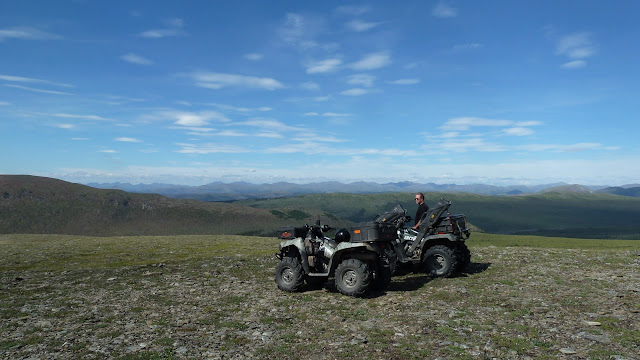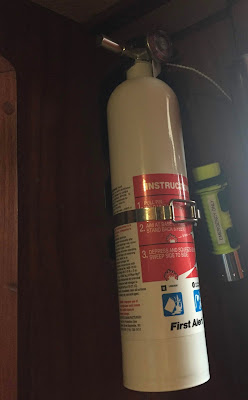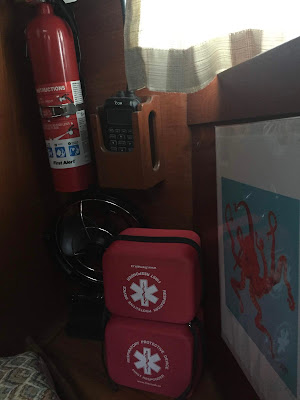 |
| Coffee first, that's a given! |
We've always had safety in mind, in our home, kayaks, boat, and outdoor activities. It's just routine for us, we have the appropriate equipment, and we use it.
For example, when we went ATVing on our 4-wheelers, we hardly ever saw anyone wearing a helmet. We always wore ours, had a handheld GPS, bear spray, PLB's, Sat phone, FS Radios, and firearms. We carried two backpacker stoves, fuel, food, sleeping bags, tent, tools, medical kit, and extra warm wear. We took all of this with us whether it was an outing for an hour or for a week, when you need it, you need it.
I was looking at photos of our previous adventures, and couldn't help but post a few of my favorite ones.
 |
| Wrangell- St Elias National Park and Preserve |
I was looking at photos of our previous adventures, and couldn't help but post a few of my favorite ones.
 |
| Wrangell-St Elias Park and Preserve |
 |
| Denali Highway |
 |
| A cow and calf moose came out of the brush, when I thought I was being followed by a bear. |
 |
| Prince Willam Sound, Harriman Fjord |
We have an extra paddle, paddle float, and pump attached to the kayak. We're wearing our Kokotat drysuits, paddle gloves, paddle leash, and PFDs. In a pocket on the PFD we have flares, signal mirror, flashlight, and PLB,. Mounted on the PFD, we have a knife, a VHF radio, a combination strobe/flash light, and a storm whistle. Tucked into the kayak is the same camping gear we carry on the ATVs [tents, sleeping bags, food, stove, cookware, 1st aid, etc.] a Storm Cag, etc.
 |
| Fireweed at sunset. |
Sorry, I digress... sure was fun to look through older photo albums. Oh, okay, one more.
 |
| White Mountains National Recreation Site |
Bill has been outfitting Denali Rose, with safety above coffee. 😁Our redundant chart systems, six anchors onboard, food to last us through the apocalypse, a medical kit worthy of a paramedic, radios, flashlights, signaling flares, ditch bags, EPIRBs, PLBs, PFDs, networked, talking, smart phone programmable and controllable, combination smoke/CO alarms, and fire extinguishers. Lots of fire extinguishers... [9 not including the one in the dinghy— or the automatic engine room system...]
And speaking of smoke/CO alarms... ours talk to us— and each other. [But they don't gossip...] The ones we replaced also talked [letting us know if it was fire or CO alarm.] The Nest alarms take it to the next level. They are networked and announce on all units throughout the boat. They are far more sensitive, do better at avoiding false alarms [steam or burnt toast] and show you the levels of smoke/CO on your smart phone so you can determine if things are getting worse. [They also tell you if it is getting better or worse...]
Compare this to having a piercing alarm somewhere in the boat wake you. Where is that coming from and what is the issue?
Imagine sleeping in our aft cabin and having the smoke alarm gong like an intercom and clearly, calmly announce, Heads-up; There is smoke in the Galley. The alarm may sound. You sit up and mute it from your smartphone [or from any of the other networked smoke alarms] and investigate. Bill is up early cooking a French omlette, and the cheese crust is smoking a bit more than usual... All is well... [Where's my coffee?...]
Then five minutes later it announces; There is still smoke in the Galley. It is getting worse. The alarm may sound. The alarm is loud... [The omlette must almost be ready...] A faint 'Sorry' is heard coming from the Galley... The next announcement you hear is: The smoke alarm is over... [Breakfast is ready...]
You get the idea... And, if you have their cameras, they start sending images from the affected area which you can view on your smart phone. [Think engine room...] Oh, and they send you emails and text messages about everything— including self test and battery status. [No more waking up to a chirping low battery alarm somewhere in the boat... We think Nest smoke/CO detectors are a great safety enhancement well worth the $...
This photo is a good example of redundant safety. On top is the new Maus Fire Extinguisher, made in Sweden. [Here is a Practical Sailor article that was published after we adopted the Maus.] It's lightweight, leaves no residue [no clean-up after use...] and requires no maintenance. Next is the conventional marine extinguisher, attached to it is a glow-in-the-dark 1200 lumen diver's flashlight, and another underneath. Next to that, is the general use flashlight [waterproof 900+ lumens. We have 10 all the same...] All flashlights have lithium bateries; rechargable in the general use flashlights.
And speaking of smoke/CO alarms... ours talk to us— and each other. [But they don't gossip...] The ones we replaced also talked [letting us know if it was fire or CO alarm.] The Nest alarms take it to the next level. They are networked and announce on all units throughout the boat. They are far more sensitive, do better at avoiding false alarms [steam or burnt toast] and show you the levels of smoke/CO on your smart phone so you can determine if things are getting worse. [They also tell you if it is getting better or worse...]
Compare this to having a piercing alarm somewhere in the boat wake you. Where is that coming from and what is the issue?
Imagine sleeping in our aft cabin and having the smoke alarm gong like an intercom and clearly, calmly announce, Heads-up; There is smoke in the Galley. The alarm may sound. You sit up and mute it from your smartphone [or from any of the other networked smoke alarms] and investigate. Bill is up early cooking a French omlette, and the cheese crust is smoking a bit more than usual... All is well... [Where's my coffee?...]
Then five minutes later it announces; There is still smoke in the Galley. It is getting worse. The alarm may sound. The alarm is loud... [The omlette must almost be ready...] A faint 'Sorry' is heard coming from the Galley... The next announcement you hear is: The smoke alarm is over... [Breakfast is ready...]
You get the idea... And, if you have their cameras, they start sending images from the affected area which you can view on your smart phone. [Think engine room...] Oh, and they send you emails and text messages about everything— including self test and battery status. [No more waking up to a chirping low battery alarm somewhere in the boat... We think Nest smoke/CO detectors are a great safety enhancement well worth the $...
 |
| Galley (kitchen) |
This photo is a good example of redundant safety. On top is the new Maus Fire Extinguisher, made in Sweden. [Here is a Practical Sailor article that was published after we adopted the Maus.] It's lightweight, leaves no residue [no clean-up after use...] and requires no maintenance. Next is the conventional marine extinguisher, attached to it is a glow-in-the-dark 1200 lumen diver's flashlight, and another underneath. Next to that, is the general use flashlight [waterproof 900+ lumens. We have 10 all the same...] All flashlights have lithium bateries; rechargable in the general use flashlights.
Did you notice the bottle opener next to the black flashlight, and the backup bottle opener next to it, as well as at least 4 [different] pepper grinders? 😀(Priorities)
 |
| No glass door to break in an emergency! |
There's more!
 |
| Attached to a lower side wall in forward V-berth. |
 |
| Companionway stairs |
Top stair, emergency glow-in-the-dark flashlight, and EPIRB. [1 of 2] (Emergency Position Indicating Radio Beacon) It's located conveniently in case you have to grab it on the way out of a sinking boat, and need to alert the Coast Guard to come to your rescue. It's not to be used lightly, it's for abandon ship, or life and death emergency. [Likewise for the PLBs on our PFDs, and in our liferaft... Yes; 5 satellite emergency beacons— not including the SOS button on our Iridium Extreme sat phone...] The red handle is the manual activation for the automatic engine room fire suppression system, once activated, it'll kill the engine, and fuel pump. The black circle is the override to allow us to restart the engine after activation [once we have confirmed it is safe to do so...] That top step is loaded with good stuff.
The second step is obviously another fire extinguisher. The third step has another new addition, it' a Respiratory Protective Device. Once you put it on, and tighten the mask, it will filter chemical substances, carbon monoxide, and toxic gases for up to sixty minutes. Inside the case is the hood, and a pair of fire gloves to protect your hands. We have these masks in the forward V-berth, within easy reach of the galley, under the companionway steps, and in our back cabin. [Yup; 4 of those puppies...] Did you notice the black cord next to the mask? It's the back-up VHF radio and mic, [with a remote mike on the cockpit steering station and a separate antenna and power supply...] It's..... what? Say it with me, REDUNDANCY.
And more.
 |
| Mounted right outside of engine room door. |
 |
| Flashlight within easy reach in main salon. Note how they either face the exit direction or the headliner— so if turned on and left in their holders they light the way... |
 |
| Flashlight mounted on washing machine, next to tool storage. |
And more.
 |
| Right outside mid cabin doorway, leading aft |
 |
| Back cabin, where we sleep. |
Holy Smokes! (not punny 😉) Can you see that? (I know photo is kind of dark.) No glow-in-the-dark flashlight in our cabin! What's with that? Maybe it's made okay by the redundant VHF DSC handheld radio next to the fire extinguisher, or maybe he hasn't installed it yet, Bill is still adding flashlights to handy places. [ed: It is stowed in a locker at present...] Oh, I forgot to mention, there is another of the large fire extinguishers in the aft hanging locker in our cabin. [Yup. We sleep with two fire extinguishers and two of the fire hoods... Can you tell Bill has had some experiences having to deal with serious fires in the past...? We practice having 60 seconds to put it out- or bail out...]
 |
| Attached to the binnacle in the cockpit. |
 |
Bill attached a fire extinguisher in the outside cockpit, and I made a cover to protect it from the sun. Just one quick yank on the cover, and off it comes. A volunteer fireman gave me a patch from the Wrangell Fire Department to sew on. Local color. [The idea being always have extinguishers where you can fight your way into— or out of— a fire...]
Lets review the US Coast Guard Requirements for a boat our size:
 |
 |
| No water to waste, water is for drinking, or making coffee. |
Forget water, I want to try out the new MAUS extinguishers! [Update 27-May-2019 by Bill: Be careful what you wish for... We used one to put out a small but serious electrical fire on a neighboring vessel. Worked as expected, and no clean-up... Here is a Cruiser's Forum post and a Practical Sailor article with a few more details...]
As always, we enjoy hearing from you, either here in comments or on our Facebook Denali Rose Sailboat page.






















